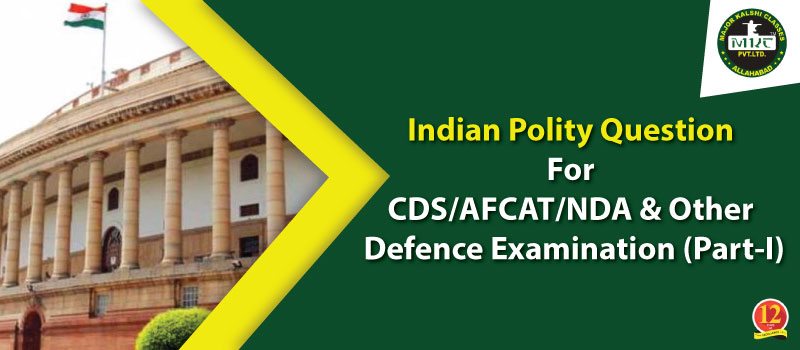Indian Polity Questions For CDS/AFCAT/NDA & Other Defence Examination (Part-I)
In defence examinations, General Knowledge or GK plays a significant role. It not only helps students to score good marks in the written exams but also crack the SSB interview. Exams like CDS, AFCAT, and NDA & NA act as a game changer and give a winning position to candidates. Having good command over the subjects like GK is a must. Indian Polity is one of the most important topics in GK subject. It is highly beneficial for students to prepare this topic in order to score good marks in the written exam. Here, we bring some of the Indian Polity questions to help students in their preparation.
Que-1. Which of the following is/are correctly matched?
- India’s National Song-Vande Mataram
- India’s National Flower-Rose
III. India’s National Animal-Tiger
- India’s National Bird-Eagle
(a) I and IV
(b) I, II and III
(c) II, III and IV
(d) I and III
Ans: (d)
Que-2. The Indian Constitution establishes a secular state, meaning:
- The State treats all religions equally.
- Freedom of faith and worship is allowed to all the people.
- Educational institutions, without exception, are free to impart religious instruction.
- The State makes no discrimination on the basis of religion in matters of employment.
(a) I and II
(b) I, II and III
(c) II, III and IV
(d) I, II and IV
Ans: (d)
Que-3. The first attempt at introducing a representative and popular element in the administration was made by:
(a) Indian Councils Act, 1900
(b) Indian Councils Act, 1909
(c) Government of India Act, 1935
(d) Indian Councils Act, 1919
Ans: (b)
Que-4. Match the following:
Constitutional Provisions Sources
- Federation 1. USA
- Parliamentary 2. Britain
- Directive Principle 3. Canada
- Fundamental Rights 4. Ireland
A B C D
(a) 2 1 4 1
(b) 2 3 1 4
(c) 3 4 2 1
(d) 3 2 4 1
Ans: (d)
Que-5. The correct nomenclature of India according to the Preamble is:
(a) Sovereign, Secular, Democratic Republic
(b) Sovereign, Democratic Republic
(c) Sovereign, Socialist, Secular, Democratic Republic
(d) Sovereign, Secular, Socialist Democracy
Ans: (c)
Que-6. Untouchability is abolished and its practice is punishable according to:
(a) Article 15
(b) Article 16
(c) Article 17
(d) Article 15(4)
Ans: (c)
Que-7. Which of the following is not a condition for becoming a citizen of India?
(a) Birth
(b) Acquiring property
(c) Descent
(d) Naturalization
Ans: (b)
Que-8. Who is competent to prescribe conditions as for acquiring Indian citizenship?
(a) Parliament
(b) State Legislatures
(c) President
(d) Attorney General
Ans: (a)
Que-9. The inspiration of ‘Liberty, Equality and Fraternity’ was derived from:
(a) American Revolution
(b) French revolution
(c) Russian revolution
(d) None of the above
Ans: (b)
Que-10. Match List-l with List-II and select the correct answer using the codes given below the Lists:
List-I – (Provision of the Constitution of India)
- Amendment of the Constitution
- Directive Principles
- Emergency Power of the President
- The Union-State Relationship
List-II (Source)
- Constitution of Germany
- Constitution of Canada
- Constitution of South Africa
- Irish Constitution
A B C D
(a) 1 2 4 3
(b) 3 4 1 2
(c) 1 4 2 3
(d) 3 1 4 2
Ans: (b)
In addition to this, there are plenty of Indian Polity Questions that students should prepare for various competitive exams, including CDS, NDA, and AFCAT. Check out some more examples of Indian Polity Questions here:
Que-11. The Cabinet Mission to India was headed by:
(a) Stafford Cripps
(b) A.V. Alexander
(c) Lord Pethick Lawrence
(d) Hugh Gaitskell
Ans: (c)
Que-12. The Constitution of India was adopted by the:
(a) Governor General
(b) British Parliament
(c) Constituent Assembly
(d) Parliament of India
Ans: (c)
Que-13. When the Constituent Assembly for the Dominion of India reassembled on 31st October, 1947, its reduced membership was:
(a) 299
(b) 311
(c) 319
(d) 331
Ans: (a)
Que-14. Who among the following was the Constitutional adviser to the Constituent Assembly of India?
(a) Dr. B.N. Rao
(b) Dr. B.R. Ambedkar
(c) K.M. Munshi
(d) M.C. Setalvad
Ans: (a)
Que-15. The Constitution of India was enacted by a Constituent Assembly set up:
(a) Under the Indian Independence Act, 1947
(b) Under the Cabinet Mission Plan, 1946
(c) Through a resolution of the provisional government
(d) By the Indian National Congress
Ans: (b)
Que-16. Who presided over the inaugural meeting of the Constituent Assembly of India?
(a) Sachidananda Sinha
(b) B. R. Ambedkar
(c) Dr. Rajendra Prasad
(d) P. Upendra
Ans: (a)
Que-17. Who was the President of the Constituent Assembly?
(a) Pt. Jawaharlal Nehru
(b) Dr. Rajendra Prasad
(c) Dr. B.R. Ambedkar
(d) C. Rajagopalachari
Ans: (b)
Que-18. The demand for the Constituent Assembly was put forward by the Indian National Congress in 1936 at its session held at:
(a) Kanpur
(b) Bombay
(c) Lucknow
(d) Lahore
Ans: (c)
Ques-19. The Constituent Assembly for undivided India first met on
(a) 6th December 1946
(b) 9th December 1946
(c) 20th February 1947
(d) 3rd June 1947
Ans: (b)
Ques-20. When the Constituent Assembly for the Dominion of India reassembled on 31 st October, 1947, its reduced membership was:
(a) 299
(b) 311
(c) 319
(d) 331
Ans: (a)
The above are some of the examples of questions that might be asked in the defence exams like NDA, CDS, and AFCAT. Students should revise all these Indian Polity questions in order to score good marks in the written exam. In addition to this, there are plenty of books and study material available that prepare students for these defence examinations. Candidates can easily purchase these books and start their preparation.

Moreover, if you want to analyze your preparation in a real-time basis, you can practice our online test series. Major Kalshi Classes brings online test series that help candidates get the real-time experience. Additionally, we provide books and study material that is designed according to the syllabus of defence exams. The trend analysis, detailed explanations in easy language, model papers and question banks are included in all of these books. Buy our books for better practice and preparation. Our primary concern is to prepare students for defence exams and help them qualify their written exam as well as SSB interview in the first attempt. All the very best for your exam.
For more information regarding DLP kindly visit- http://mkcpublication.in/books/correspondence-kit/
We hope that this blog provides you with all the required details about the Indian Polity Questions For CDS/AFCAT/NDA & Other Defence Examination (Part-I). If you are a candidate preparing for Defence Forces, avail the Best Books or Study Material from MKC Publications. For further inquiry, feel free to call us on +91 9696330033/9696220022 or
Visit us via:
- Our Official website
- Or at Shapath Building, 105/244, Tagore Town, Allahabad – 211002
To get detailed information on Notifications, Syllabus, Tips and Tricks, Admit Card Dates, Result, Cut off, Trend Analysis, Information about Physical Fitness Test and Medical Examination and Current Affairs, simply Visit Our YouTube Channel. You can also follow us on Instagram.
Feel free to share your thoughts about this blog in the comment section given below.








